Islamic State targets vulnerable refugee children for recruitment
Extremist groups are offering money and food in bid to radicalise youngsters
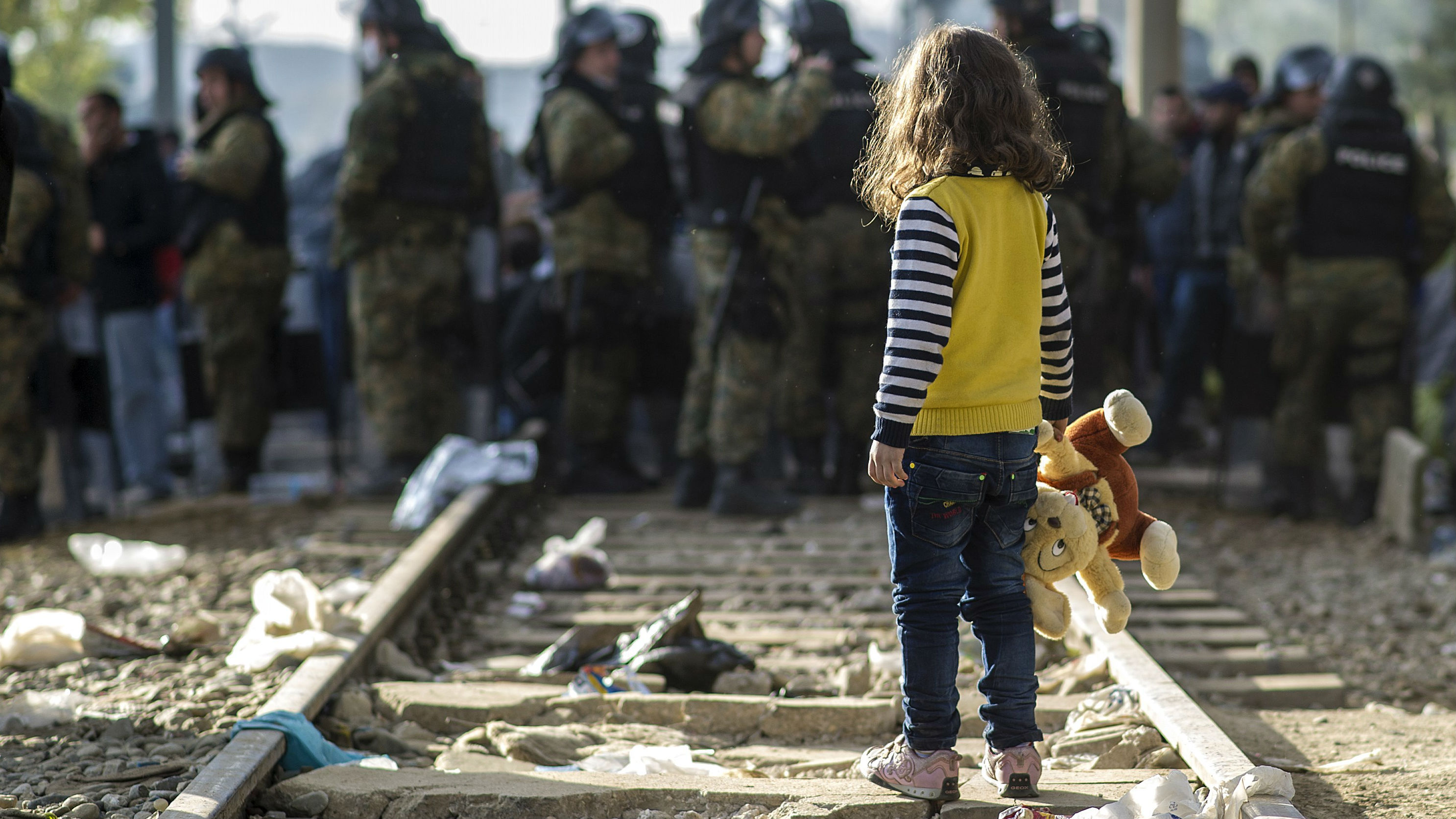
A free daily email with the biggest news stories of the day – and the best features from TheWeek.com
You are now subscribed
Your newsletter sign-up was successful
Calais mayor plans theme park amid refugee crisis
14 October
The mayor of Calais hopes to open a theme park in the town to counter the negative headlines it has attracted as a result of the refugee crisis.
The Week
Escape your echo chamber. Get the facts behind the news, plus analysis from multiple perspectives.

Sign up for The Week's Free Newsletters
From our morning news briefing to a weekly Good News Newsletter, get the best of The Week delivered directly to your inbox.
From our morning news briefing to a weekly Good News Newsletter, get the best of The Week delivered directly to your inbox.
Natacha Bouchart believes the €275m (£204m) project will improve the Channel port's reputation and transform it into a popular tourist resort.
The theme park, Heroic Land, would be constructed on a 50-hectare site about two miles from the New Jungle, the camp that houses around 3,000 migrants trying to reach Britain, reports The Times.
Due to open in 2019, the park could attract 1.5 million visitors a year, says the team behind the project.
It would boast 32 attractions with themes that include 20,000 Leagues Under the Sea, Lord of The Rings and Japanese manga cartoons. An online video presents a CGI mock-up of the completed project. A neighbouring commercial village will combine leisure, shopping, hotels and restaurants.[[{"type":"media","view_mode":"content_original","fid":"85465","attributes":{"class":"media-image"}}]]
A free daily email with the biggest news stories of the day – and the best features from TheWeek.com
"There is a problem of migrants here and that harms the area's image," said Marc Legrand, a manager at Calais Promotion, the business development agency for the town. "The creation of the park will associate Calais with a positive image."
The French government has bankrolled a €220,000 study on the viability of the proposal, while the regional council will inject a further €400,000. Bouchart hopes that private investors will come up with the €275m construction cost.
The project would create 1,000 jobs in a city that has an unemployment rate of almost 17 per cent – one of the highest in France.
Yesterday it was reported that the New Jungle camp now features its own nightclub, set up by British activists in a dome-shaped tent called the Good Chance Theatre.
Refugee crisis: Angela Merkel headscarf mock-up sparks anger
7 October
A German television station has been accused of spreading anti-Islamic propaganda after it displayed an image of Chancellor Angela Merkel wearing a headscarf.
The photoshopped image was used by ARD as a backdrop for a debate on refugee quotas. It showed Merkel wearing a traditional chador against a backdrop of mosques flying German flags.
"This is not constructive journalism," one viewer wrote on social media, while others called the report "manipulative" and "appalling", according to the BBC.
Critics also pointed out that the image was similar to one used by the far-right, anti-Islam Pegida group which campaigns for stricter immigration laws and for limits to the country's refugee intake.
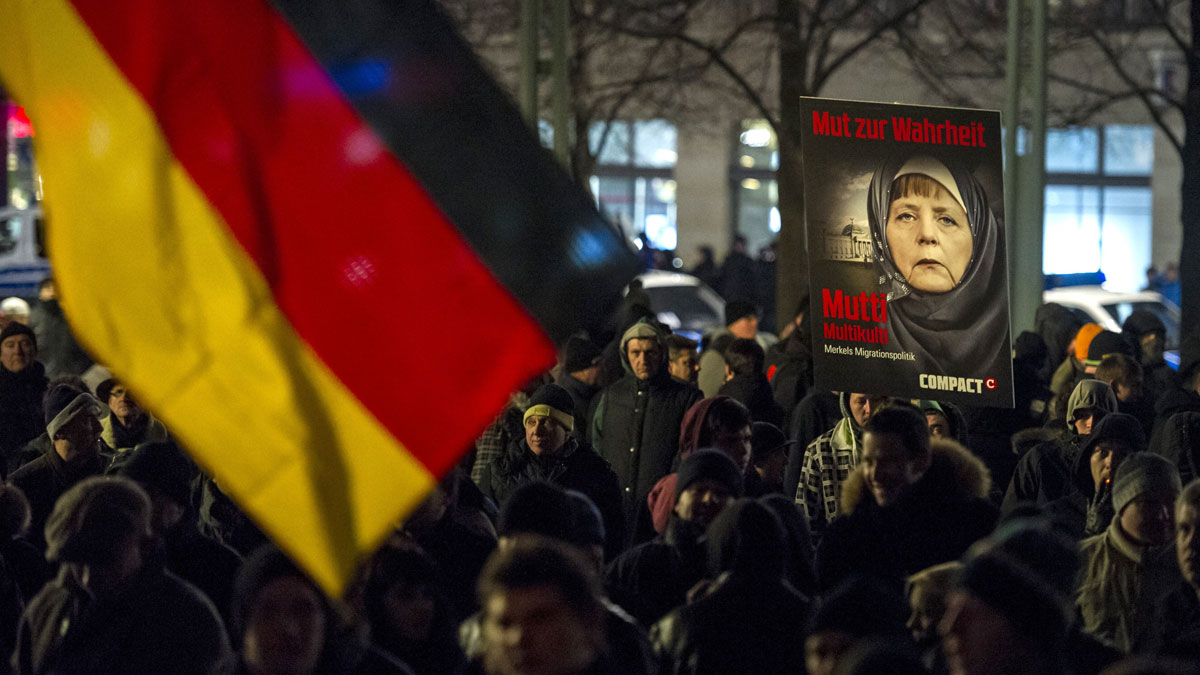
The station defended its decision, saying the graphic was intended as satire and reflected "the achievements of our Western society - freedom of expression, press freedom and equality".
Germany remains divided on how to respond to the worst refugee crisis since the Second World War, as the country prepares to accept more than a million people fleeing war and conflict.
Meanwhile, the EU has launched a new naval operation in the Mediterranean. Previous efforts had focused on search and rescue, but under Operation Sophia, authorities will be given the power to search, seize and divert boats suspected of being used for human smuggling.
This comes as secret plans emerged to deport hundreds of thousands of failed asylum seekers from Europe. The documents, seen by The Times, include threats from Brussels to withdraw aid, trade deals and visa arrangements from countries that refuse to take back economic migrants.
But civil liberties groups warn that the proposals will not work. "Refugees, who have fled from war, persecution and poverty do not want to return to the country they have come from," said Tony Bunyan, the director of Statewatch.
Refugee crisis: EU opens its chequebook but tightens its borders
24 September
European Union leaders have pledged additional funding to international aid agencies and agreed on new measures to secure the continent's borders in response to the growing refugee crisis.
At an emergency summit in Brussels, £700m was promised to help UN agencies support refugees in the Middle East in order to stem the tide of refugees arriving in Europe, the BBC reports.
More help for Lebanon, Jordan and Turkey was also promised during the meeting, as was greater assistance for Balkan states, where thousands of refugees arrive daily as they travel north.
"The EU chequebook was the key instrument" at the summit, but leaders also agreed to strengthen the EU's external borders by boosting border security forces, The Guardian reports.
EU Commission President Jean-Claude Juncker described the talks as "excellent" and said they took place in a "better than expected atmosphere", but deep divisions within the union have nonetheless emerged.
The controversial quota deal pushed through earlier this week led Hungary's Prime Minister to accuse Germany of "moral imperialism", while Slovakia and the Czech Republic threatened to take the matter to the courts.
Donald Tusk, the president of the European Council who chaired yesterday's summit, admitted that the measures would not solve the crisis, but said they were all "necessary steps" in the right direction.
He warned that "the greatest tide of refugees and migrants is yet to come" and urged Europe to correct its policy of "open doors and windows".
But Michael Moller, director-general of the UN office in Geneva, urged compassion. "Any one of us may one day need refuge," he writes in The Guardian. "Empathy, generosity and sound policies today will greatly improve the chances of the same being applied to our calamities tomorrow."
Ultimately, the measures agreed this week will do little to ease the immediate chaos and tensions at Europe's border or to slow the boatloads of refugees reaching the Greek islands from Turkey, says Reuters. The same issues will dominate further crisis talks scheduled for next month.
Refugee crisis: EU pushes through quotas despite opposition
23 September
European interior ministers have approved a controversial plan to relocate 120,000 refugees across the continent over the next two years, despite fierce opposition from some members.
The proposal to distribute the refugees across the EU's 28 member states is designed to take pressure off countries like Italy and Greece, where the vast majority have arrived by boat this year.
French interior minister Bernard Cazeneuve praised the deal, calling it a "testament to the capacity of Europe to take responsibility" in the wake of the growing humanitarian crisis.
But leaders remain bitterly divided over the best way to tackle the continent's worst refugee crisis since the Second World War. After days of "toxic rhetoric", the proposal was pushed through on a qualified majority vote, the Daily Telegraph reports.
A series of angry statements was issued shortly after the announcement. Four nations - the Czech Republic, Hungary, Romania and Slovakia - voted against the plan, while Finland abstained.
The Hungarian government dubbed the scheme an invitation to economic migrants, while Slovakia's Robert Fico vowed that "as long as I am prime minister, migrant quotas will not be implemented"
The Financial Times describes the agreement "a compromise plan, intended to take some of political heat out of the decision", while The Guardian says the result will "feed central European resentment of what they perceive as western - and especially German - bullying".
But the UN refugee agency said the measures did not go far enough, with the 120,000 figure equivalent to the number of refugees that arrive in Europe in a single 20 day-period.
"The relocation plan in itself will not be sufficient to solve the crisis," said the organisation's Carlotta Sami. "This is clearly not enough. The EU states will have to increase the numbers."
Meanwhile, the first Syrian refugees have arrived in Britain since the government announced that it would welcome 20,000 in the next five years. David Cameron has opted out of the EU quotas, but promised to welcome more refugees after mounting pressure.
The Home Office has not clarified how many were in the group or if they were part of the extended relocation scheme, but the BBC's Daniel Sandford says the first arrivals amounted to "little more than a handful" of "very vulnerable" refugees.
Refugee crisis: more deaths at sea as EU prepares for talks
21 September
European leaders are preparing to hold another round of crisis talks this week, as the continent struggles to cope with the growing refugee crisis and the death toll continues to rise.
Foreign ministers from the 28-member states will attend an emergency summit in Brussels on Wednesday to discuss longer-term strategies to deal with the crisis – but deep divisions remain.
Speaking ahead of the talks, Angela Merkel called on other European nations to remember that the crisis is "not just a German challenge, but one for all of Europe", The Guardian reports
Leaders remain bitterly divided on the issues of mandatory quotas and planned redistribution schemes, with several Eastern European countries refusing to take part.
The ongoing humanitarian crisis has triggered a diplomatic stand-off in the region. The Hungarian government called Croatia's prime minister "pathetic" after the government accused Budapest of breaking international law by refusing to allow refugees to cross its border.
Romania, meanwhile, called Hungary's border closures "autistic" which prompted the Hungarians to taunt Romania over corruption charges faced by its prime minister," The Times reports.
The war of words was "all too reminiscent" of the language of the regional tensions of 25 years ago, says a Guardian editorial.
"Old hostilities [have been] reignited by the common European failure to overcome the difficulties and forge a joint strategy to share the problem and address it in a pragmatic and humane way," it says.
The diplomatic row comes after 13 people, including six children, drowned off the coast of Turkey, after their dinghy collided with a ferry. The refugees were making their way to the Greek island of Lesbos, where thousands of people fleeing conflict in Syria have arrived in recent months.
Refugee crisis: chaos as Croatia closes border with Serbia
18 September
Croatia has become the latest European nation to seal off its borders after being overwhelmed by thousands of refugees entering the country.
The government made the move after more than 10,000 people entered the county following Hungary's decision to fence off its border with Serbia, forcing refugees to seek an alternative route.
Croatia had at first welcomed the refugees and promised them safe passage through the country, but within 48 hours, Croatian Interior Minister Ranko Ostojic said his country was "absolutely full".
He told refugees: "Don't come here anymore. Stay in refugee centres in Serbia and Macedonia and Greece. This is not the road to Europe. Buses can't take you there. It's a lie."
President Kolinda Grabar-Kitarovic has also instructed the military to be ready to respond.
The U-turn sparked chaotic scenes at the border, with hundreds of refugees pushing through police lines in an attempt to board trains to neighbouring Slovenia. Meanwhile, the Slovenian government said it had stopped a train carrying hundreds of refugees and would force it to return to Croatia.
"It was a scene that once again underscored the inability of European governments to comprehend and prepare for the continent’s biggest wave of mass migration since the Second World War," says The Guardian's Patrick Kingsley.
Croatia's decision follows similar moves by Germany, Austria, Slovakia and Hungary, who have all suspended the Shengen system in response to the crisis. The border closures have effectively cut off the refugees main land route from Greece to northern Europe, the BBC's Guy Delauney reports.
European Council president Donald Tusk has summoned EU leaders to an emergency summit for September 23, as the continent remains divided about how to respond to the crisis.
Meanwhile, tensions have calmed at the Hungarian border after hundreds were injured when riot fired tear gas and water cannon at refugees attempting to cross the Serbian border.
Criticism of the Hungarian government's actions has continued, with the UN High Commissioner for refugees Zeid Ra'ad al Hussein deploring the "xenophobic and anti-Muslim views" he said appear to lie at the heart of current Hungarian government policy, The Guardian reports.
Some refugees remain camped out at Europe's closed borders, while others said they planned to continue their journeys. "I just want peace," said 40-year-old Amjad el-Omairi from Iraq. "And I'll keep going even if I have to cross another sea to find it."
UN 'shocked and saddened' by Hungary's clashes with refugees
17 September
The United Nations has condemned Hungary's response to the refugee crisis after riot police fired tear gas at crowds attempting to cross the Serbian border, injuring up to 300 people.
The Roszke-Horgos border crossing has become the latest flashpoint in the growing crisis, with thousands of refugees left stranded after the Hungarian government decided to close its borders.
Riot police used tear gas, pepper spray and water cannon to push refugees, including women and children, back from the razor-wire fence, The Guardian reports.
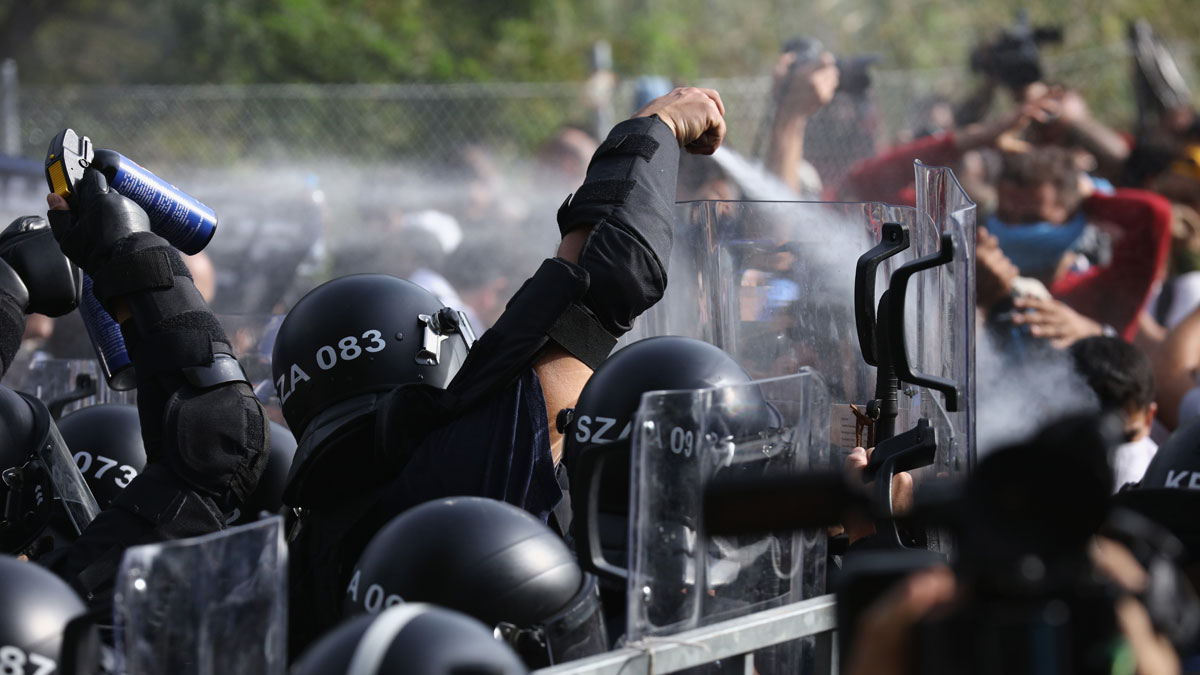
Amnesty International observers at the scene said at least seven children were among those injured during the clashes, with one sustaining a head wound and others blinded by pepper spray.
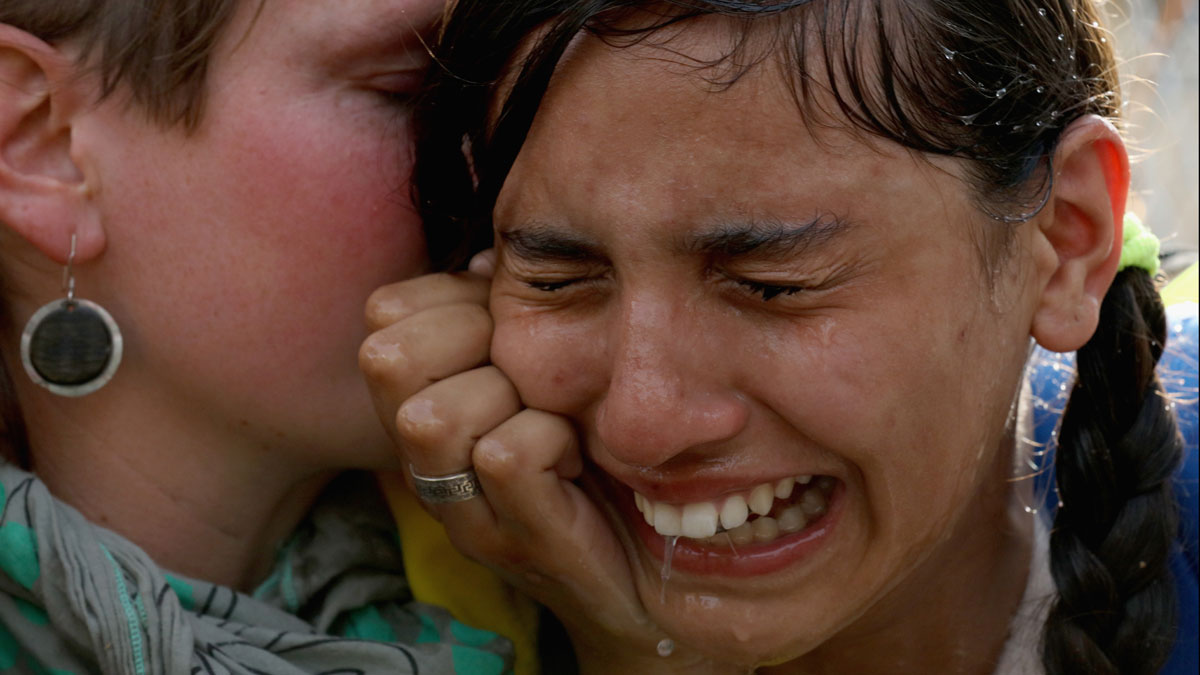
Police said the refugees had become "aggressive" and were throwing sticks and stones. "[We are] protecting the border of Hungary and the EU while respecting the law," they said in a statement.
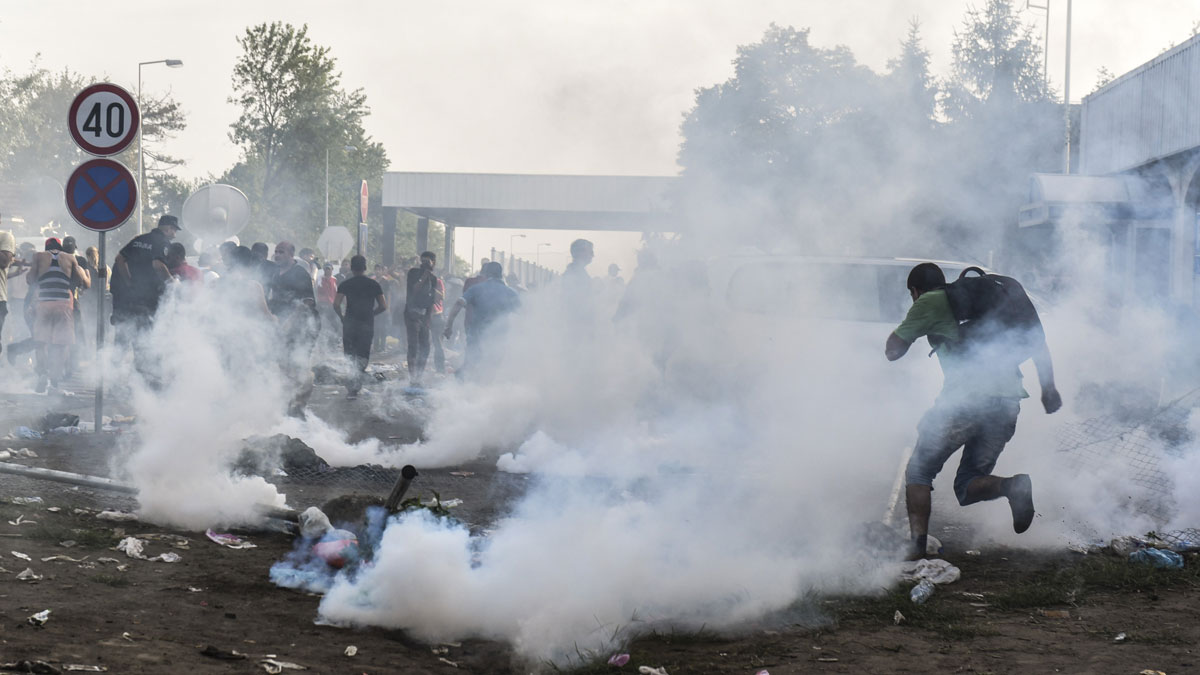
However, a UN official at the scene said that it did not appear that the refugees had breached the barrier, Reuters reports.
The UN Refugee Agency said it was "shocked and saddened to witness Syrian refugees, including families with children who have already suffered so much," being treated in this manner, while International Rescue Committee chief David Miliband said Hungary's response to the humanitarian disaster reveals "a dark side of the European character".
The Serbian government also responded with anger, arguing that Hungarian police were not authorised to fire into Serbian territory. Accusing Hungary of "brutal" behaviour, Prime Minister Aleksandar Vucic called on member states to behave "in line with European values".
In stark contrast to the Hungarian response, Croatia has promised to allow refugees safe passage through the country, with Croatian police waiting at the Serbian border to transport refugees to the nearest town. Thousands have entered the country in recent days in search of an alternative route to Western Europe.
But adding to the chaos and uncertainty, Croatian officials warned that there are two square kilometres of live landmines on the Serbian border left over from the Balkans war, The Guardian reports.
"There is always the possibility that somebody could enter these suspected hazardous areas and get wounded or even killed," said Miljenko Vahtaric, from the Croatia Mine Action Centre.
But those who have already made long, dangerous journeys to escape the war in Syria say it is worth the risk. "We have passed too much to give up now," Mehmed from Damascus told Sky News.
-
 5 cinematic cartoons about Bezos betting big on 'Melania'
5 cinematic cartoons about Bezos betting big on 'Melania'Cartoons Artists take on a girlboss, a fetching newspaper, and more
-
 The fall of the generals: China’s military purge
The fall of the generals: China’s military purgeIn the Spotlight Xi Jinping’s extraordinary removal of senior general proves that no-one is safe from anti-corruption drive that has investigated millions
-
 Why the Gorton and Denton by-election is a ‘Frankenstein’s monster’
Why the Gorton and Denton by-election is a ‘Frankenstein’s monster’Talking Point Reform and the Greens have the Labour seat in their sights, but the constituency’s complex demographics make messaging tricky
-
 Epstein files topple law CEO, roil UK government
Epstein files topple law CEO, roil UK governmentSpeed Read Peter Mandelson, Britain’s former ambassador to the US, is caught up in the scandal
-
 Iran and US prepare to meet after skirmishes
Iran and US prepare to meet after skirmishesSpeed Read The incident comes amid heightened tensions in the Middle East
-
 Syria’s Kurds: abandoned by their US ally
Syria’s Kurds: abandoned by their US allyTalking Point Ahmed al-Sharaa’s lightning offensive against Syrian Kurdistan belies his promise to respect the country’s ethnic minorities
-
 Israel retrieves final hostage’s body from Gaza
Israel retrieves final hostage’s body from GazaSpeed Read The 24-year-old police officer was killed during the initial Hamas attack
-
 China’s Xi targets top general in growing purge
China’s Xi targets top general in growing purgeSpeed Read Zhang Youxia is being investigated over ‘grave violations’ of the law
-
 Syria’s Islamic State problem
Syria’s Islamic State problemIn The Spotlight Fragile security in prison camps leads to escape of IS fighters
-
 Panama and Canada are negotiating over a crucial copper mine
Panama and Canada are negotiating over a crucial copper mineIn the Spotlight Panama is set to make a final decision on the mine this summer
-
 Why Greenland’s natural resources are nearly impossible to mine
Why Greenland’s natural resources are nearly impossible to mineThe Explainer The country’s natural landscape makes the task extremely difficult